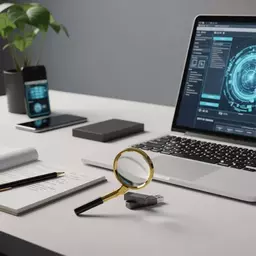Risk Assessment
Identify vulnerabilities within your organization through regular assessments. For more insights into protecting your business, consider understanding corporate investigations and fraud prevention.
Stay informed with expert insights on forensic investigations, fraud detection, and legal evidence handling. Subscribe for clarity in complex situations.
Posted on: 2025-10-20
By: Clara Ashford
In a world where fraud is increasingly sophisticated, how prepared is your organization to combat it? Understanding the nuances of fraud detection can make all the difference in safeguarding your assets and reputation.
A comprehensive fraud risk management framework is vital for detecting and preventing fraud. Below are the essential components:
Identify vulnerabilities within your organization through regular assessments. For more insights into protecting your business, consider understanding corporate investigations and fraud prevention.
Establish controls to limit access to sensitive information and financial resources.
Implement ongoing monitoring and clear reporting channels for suspicious activities.
Regularly review and refine processes to strengthen defenses against fraud.
In today's rapidly evolving business landscape, having a solid in-house fraud detection capability is more essential than ever. The consequences of fraud can be devastating, affecting not just financial stability but also reputational integrity. At TC Forensic Investigations, we recognize that effective fraud detection strategies empower businesses to make informed decisions and mitigate risks proactively.
As a seasoned private investigator with over a decade of experience, I’ve seen firsthand how organizations that prioritize fraud prevention tend to navigate challenges more effectively. In this section, we will explore why having robust in-house fraud detection capabilities is critical for your organization.
The need for effective fraud detection strategies stems from the increasing sophistication of fraudsters and the variety of methods they employ. Organizations must be vigilant and prepared to identify potential fraud before it impacts their bottom line. Here are a few key reasons why businesses need robust fraud detection:
Implementing these strategies not only protects your assets but also enhances your organization’s overall resilience against fraud. For advanced protection, exploring digital forensics in fraud detection can provide a significant edge.
Many businesses encounter obstacles when trying to establish effective fraud detection systems. These challenges can hinder their ability to respond swiftly to suspicious activities. Some common issues include:
Understanding these challenges is the first step toward developing strategies that can help overcome them. At TC Forensic Investigations, we emphasize the importance of tailored solutions that address specific fraud risks.
A comprehensive fraud risk management framework is vital for detecting and preventing fraud. It should include the following key components:
Incorporating these components into your organization’s fraud risk management strategy can significantly enhance your fraud detection capabilities, allowing you to stay one step ahead of potential threats.
To enhance your in-house fraud detection capabilities, consider integrating advanced data analytics tools. These technologies not only streamline the monitoring process but also help identify unusual patterns that may indicate fraudulent activity. Regular training on these tools ensures your team is equipped to leverage them effectively, leading to a more proactive fraud prevention strategy.
At TC Forensic Investigations, we understand that building robust fraud detection capabilities is essential for any organization. The key to effective fraud prevention lies in continuous improvement. It’s not a one-time effort; it requires ongoing vigilance and adaptation. Here are some critical takeaways to keep in mind:
By focusing on these areas, your organization can better protect itself against potential threats and ensure that fraud detection remains a priority.
Incorporating continuous improvement into your fraud detection framework is vital. Regularly reviewing and refining your processes not only keeps your practices relevant but also strengthens your defenses. Consider implementing feedback mechanisms that allow team members to share insights or experiences related to fraud detection.
By fostering a culture of ongoing enhancement, you empower your team to stay ahead of fraudsters.
The integration of technology and training is indispensable in modern fraud detection. At TC Forensic Investigations, we leverage the latest tools to assist our clients in identifying risks. Training your staff to effectively use these technologies can significantly enhance your fraud detection efforts.
By prioritizing these elements, you ensure that your team is well-equipped to combat fraud. Learn more about how AI is transforming this field by reading about AI fraud detection in investigations.
Conducting financial audits and internal investigations is crucial for uncovering potential fraud that may not be immediately visible. These practices help to identify vulnerabilities and areas for improvement within your organization.
By making audits and investigations a routine part of your operations, you’ll foster a more transparent and fraud-resistant environment.
Proactive measures are essential in the realm of fraud prevention. At TC Forensic Investigations, we believe that empowering stakeholders can make a significant difference in your fraud detection strategies.
It’s vital to involve all relevant stakeholders in your fraud prevention initiatives. When everyone is on board, the collective effort increases the chances of detecting and preventing fraudulent activities. Here’s how you can engage stakeholders effectively:
By fostering an inclusive approach, you can cultivate a culture of vigilance against fraud.
As you consider ways to enhance your organization’s fraud detection capabilities, remember to take actionable steps tailored to your specific needs. Here are some next steps to guide you:
By committing to these next steps, you can create a stronger defense against fraud and protect your organization for years to come!
Here is a quick recap of the important points discussed in the article:



 In a world where cyber threats are constantly evolving, the need for effective digital forensics has
In a world where cyber threats are constantly evolving, the need for effective digital forensics has
 Understanding the nuances of synthetic identity fraud is essential in today's digital age. As frauds
Understanding the nuances of synthetic identity fraud is essential in today's digital age. As frauds
 In the competitive landscape of corporate investigations, the choice of a private investigator can m
In the competitive landscape of corporate investigations, the choice of a private investigator can m